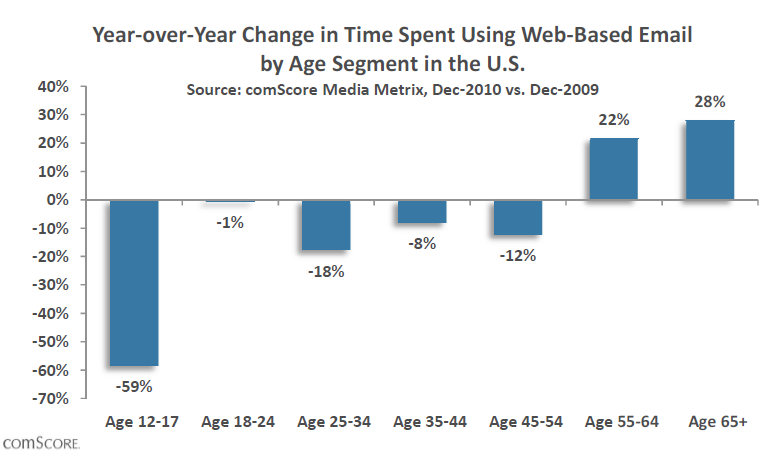The marketing research firm comScore recently released its 2010 US Digital Year in Review report that measures and analyzes trends in digital communications, social networking, device usage, and so on. The report is a fascinating examination of the forces that are shaping and changing the way we consume, share, and even produce content and information.
There are a ton of interesting charts and data points in the 2010 report, and several that are/should be interesting and important for leaders of organizations and HR professionals that have an eye towards how people demonstrate their preferences and inclinations in the consumption and interactions with digital content. One of the most notable findings in the comScore report has to do with the changes in the usage of Web-based email (Gmail, Yahoo Mail, Hotmail, and so on) in 2010. Despite an overall increases in broadband access and total time spent online, web-based email usage actually declined 8% in 2010.
See the chart below from the comScore report:

Most notable in the results are the really dramatic declines in web-based email usage in the 12-17, and 25-34 age brackets, while the 18- 24 cohort was essentially flat in 2010. The only age groups that showed an increase in web-based email usage in 2010 were the 55 years and up groups, largely rationalized with explanations like 'C'mon Grandpa, get an email account so we can keep in touch'. For what it's worth, these same age groups also saw double digit percentage increases in their use of Facebook and Twitter. Essentially, these older folks are getting online in greater numbers, and more or less doing the same things their kids have grown accustomed to.
What might this trend in decreased preference for web-based email as a method of communication by younger generations mean for the present and future workforce?
Well, it could mean nothing I suppose. Or next to nothing. I mean once those 15 year olds grow up a bit and start entering the working world they will simply be forced to use email. I mean, email makes the working world go around, right? Besides, you are the boss, not them, and if you declare that 99% of your electronic communications will be emails, then by golly that is the end of the discussion. Get with the program, Junior, just go easy on the 'Reply to all' button.
Or these macro trends in technology consumption, particularly by the upcoming generations of workers could be really important to the organization tomorrow, (maybe even sooner than you think). Some would argue that the growing popularity and adoption of SMS text messages and social network status updates and connections as the de facto means of digital communication for a generation may and will inevitably change modern business.
The data continue to reflect shifts from the more formal and traditional means of electronic communication (email, voice mail), to more social, casual, and dynamic ones (SMS, social networks). The next set of new workers to join your organization will most likely see nothing at all unusual about sending hundreds of SMS messages a day, and looking over their Facebook news feed while brushing their teeth.
What they are not as likely to understand, accept, and flourish in, is an environment where they might get 200 emails per day. Emails are kind of long, mostly kind of boring, and usually have things like 'greetings' and 'salutations'.
Come to think of it, you may need to update the old acceptable use policy, to explain what a 'salutation' is, the next generation probably never heard of the term, and even Grandma is getting sick of crafting them as well.
It's a brave, strange new world out there.
Postscipt - after finishing this post, I saw this piece on ReadWriteWeb - Smartphones outsell PCs for the first time ever. Stay thirsty my friends.